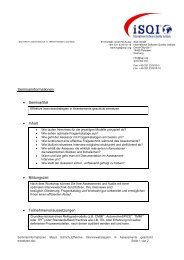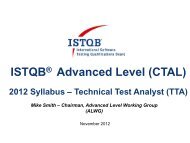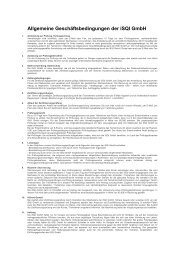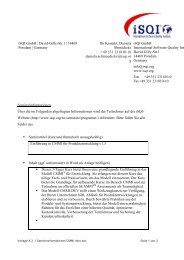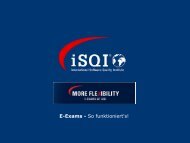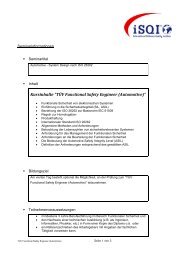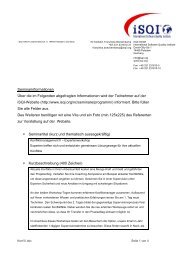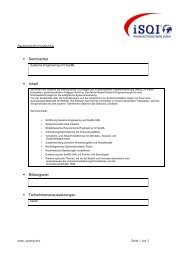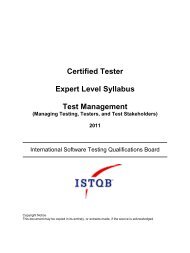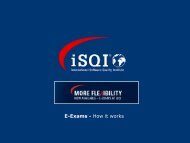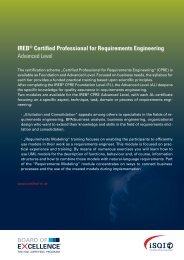conquest 2009 - iSQI
conquest 2009 - iSQI
conquest 2009 - iSQI
You also want an ePaper? Increase the reach of your titles
YUMPU automatically turns print PDFs into web optimized ePapers that Google loves.
4<br />
Greetings<br />
Ladies and gentlemen,<br />
GREETING<br />
Greeting from Dagmar Wöhrl<br />
Patron of the Conference<br />
I am very pleased to be the patron of the <strong>2009</strong> International<br />
Conference on Quality Engineering in Software Technology<br />
(CONQUEST <strong>2009</strong>) in my hometown Nuremberg. After the<br />
Conference had taken place in Berlin and Potsdam in the<br />
last three years, it has now returned to its roots: Twelve<br />
years ago, the Arbeitskreis Software Qualität Franken e.V.<br />
(ASQF e.V.) for the first time invited software developers<br />
from industry and research to an exchange of experiences<br />
on software quality standards to Nuremberg. In the meantime,<br />
CONQUEST has become an internationally acknowledged<br />
information platform for CEOs and experts from<br />
industry and research for quality assurance and further<br />
training of specialised personnel in the field of software.<br />
Modern information and communications technologies<br />
(ICTs) are an essential factor for more economic growth<br />
and employment. ICTs are also growth accelerators and innovation<br />
drivers in many further sectors due to the combination<br />
of ICTs and traditional products. In order to enhance<br />
the international competitiveness of Germany as an ICT<br />
location, the German Federal Chancellor in the year 2006<br />
initiated the IT Summit process, a high-ranking dialogue<br />
with senior representatives from the political, economic<br />
and scientific fields. The preparation of the IT Summits<br />
is coordinated by the Federal Ministry of Economics and<br />
Technology. The Third National IT Summit, which took<br />
place in Darmstadt on 20 November 2008, again highlighted<br />
the great growth opportunities of ICTs for German industry<br />
and in particular underlined the strategic significance of a<br />
software and (IT) services industry that is competitive at<br />
the global level for the overall economy and how important<br />
it is to meet the related need for skilled labour in this area.<br />
I am pleased that the quality assurance of software products<br />
and the qualification of ICT specialists are again issues<br />
at the very top of the agenda of CONQUEST <strong>2009</strong> and<br />
that special attention is paid to the cooperation with this<br />
year’s partner country, India. In view of these topics, the<br />
Conference makes an important contribution to the implementation<br />
of the decisions that were taken on the occasion<br />
of the latest IT Summit and to the further strengthening<br />
of Germany as an ICT location. Against this background, I<br />
wish CONQUEST much success and all participants many<br />
interesting contacts, talks and ideas.<br />
Yours,<br />
Dagmar Wöhrl<br />
Parliamentary State Secretary in the Federal Ministry<br />
of Economics and Technology<br />
Greetings<br />
Greeting from Ina Schieferdecker<br />
Conference Chair<br />
Dear CONQUEST participants, speakers and exhibitors,<br />
I like to welcome you to the 12th International Conference<br />
on Quality Engineering in Software Technology in Nuremberg,<br />
Germany, September 16-18, <strong>2009</strong>. We welcome our<br />
companions, newcomers, friends and colleagues from all<br />
over the world. We compiled the conference program out<br />
of over 80 submissions with the intent to offer a high-quality<br />
technical program both for academia and industry. We like<br />
to thank everybody that helped us making CONQUEST <strong>2009</strong><br />
a high-potential event.<br />
Let me share with you some recent thoughts about quality<br />
engineering in software technologies. Since the software<br />
crisis back in the 1960ies, the software industry and research<br />
emphasized the specifics and differences of software as<br />
compared to any form of hardware. I think it was right that<br />
time as the software field had to be established. However, I<br />
question that we are still right these days. Software is basically<br />
a means to make systems more efficient, more handy,<br />
more functional, and alike. Sure, software and all development<br />
artefacts have a standing on their own. We may however<br />
have to reconsider what we can learn from others.<br />
For example, I learnt at university that as software is virtual<br />
it cannot age and cannot have signs of usage, hence does<br />
not need much if at all maintenance. Today, we now know<br />
this to be a bit different: there is software being in use for<br />
30 and more years. The tools with which the software had<br />
been developed years back are not available or in use any<br />
more. The environments in which the software was running<br />
changed as well. Along its usage, the software was<br />
extended, modified and adapted to changes in its environment.<br />
All this makes often a clean architecture corrupted<br />
– the software becomes less elastic for further changes,<br />
which is comparable to ageing materials. Software maintenance<br />
has to gain more attention in our community. Methods<br />
for handling software evolution to ensure that software<br />
continues to meet organisational and business objectives<br />
in a cost effective way are needed. For example, software<br />
renovation is an approach to address issues of ageing software<br />
by refactoring them to current settings. On the other<br />
hand, immateriality of software is responsible for another<br />
phenomenon: software is easily copied. By that, software<br />
duplicates, also called clones, are created right at hand<br />
and give rise for another quality and maintenance problem:<br />
think about a failure being reported, fault being identified<br />
and corrected – however, in one clone only – not in the others.<br />
It would be appreciated to see more contributions in<br />
the direction of software evolution and quality assurance<br />
of evolving software at CONQUEST.<br />
Let me come back to the comparison with other engineering<br />
fields and consider e.g. how other fields address issues<br />
5



